Frequently Asked Questions
Why is a current BLS needed before I take ACLS, PALS or PEARS?
High quality CPR and early defibrillation are the primary interventions proven to increase the rate of survival from cardiac arrest. CPR skills diminish rapidly. As a participant in an advanced life support class, your CPR skills are the basis of all your life saving measures. As a team leader, you must be able to provide feedback to your participants on the quality of their CPR. Other certifications such as ATLS, ETLS, etc do not have the same focus on basic life support skills as BLS.
I can't find a BLS to attend prior to ACLS or PALS, Can I complete the BLS After?
No. The skills learned in Basic Life Support are the foundation of all resuscitation attempts. The Heart & Stroke Foundation requires a valid BLS be in place in order to attend any advanced life support class. The skills and knowledge will be utilized throughout the advanced course and tested during the course, therefore they cannot be learned or refreshed after the advanced course is completed.
My CPR certificate is with another provider. Why isn’t that good enough to take ACLS, PALS or PEARS?
There may be slight differences between the skills taught in other CPR programs. The advanced skills taught in ACLS, PALS and PEARS build upon the BLS skills taught in the Heart and Stroke Foundation course. The Heart and Stroke Foundation actively monitors the quality assurance of their programs to ensure you receive quality education to ensure the best possible outcome for your patients. The Heart and stroke offers an online bLS challenge exam which you can complete through the portal. Successful completion of the challenge will allow you to enroll in a heart and stroke BLS renewal course.
I took CPR- HCP- C before. What happened to that course?
The Heart and Stroke Foundation has re-named their CPR course for healthcare professionals as Basic Life Support (BLS). This certificate is valid for one year. This course is a pre-requisite for all advanced life support classes offered by the Heart and Stroke Foundation. The Heart and Stroke Foundation also has a CPR course for non-healthcare professionals called Heartsaver. Please contact us if you would like to arrange a date to participate in a Heartsaver course.
How do I register for a course?
Please click on the Red button marked “go to Heart and Stroke portal”. This is located on our course pages below the course listings. This will take you to the Heart and Stroke Foundation portal. Please sign in and click on the Find a course button. Then look down the left side of the screen with search filter boxes and locate the Course Code box. enter the course number listed on our page to locate the course. Please include the c- in the search box. If you are registering for a private course session, you will have to search for the course using the course number provided. You can then click register. This will generate an email to you and us indicating your registration.
After registering on the Heart and Stroke portal, We will email you further information.
I don’t remember my Heart and Stroke number, or password, should I make a new account?
No, please do not create a new Heart and Stroke account. Please enter your email and hit the forgot my password. You will receive an email with a temporary password from the Heart and Stroke Foundation. If you cannot remember your email address or ID number, please contact the Heart and Stroke resuscitation portal at to obtain your ID number. Creating another account results in your certificates being split across numerous accounts instead of in one account.
Will I receive a wallet card upon completion?
Completion cards are now electronic. You will receive an email directly from the Heart and Stroke Foundation of Canada notifying you of your course completion. You can download the pdf from your account in the portal. If you wish a paper copy, there is an additional fee payable to the course instructor. You will then be mailed out a paper card directly from the Heart and Stroke Foundation after the course is completed.
Do the courses take the entire time listed? Will I be done early?
Course completion times vary. The times listed are approximate based on 6 participants per group for advanced courses and 12 for the CPR courses. Each course has required content and may run slightly longer to meet the educational needs of the participants. Remediation will be done at the end of the course if needed.
